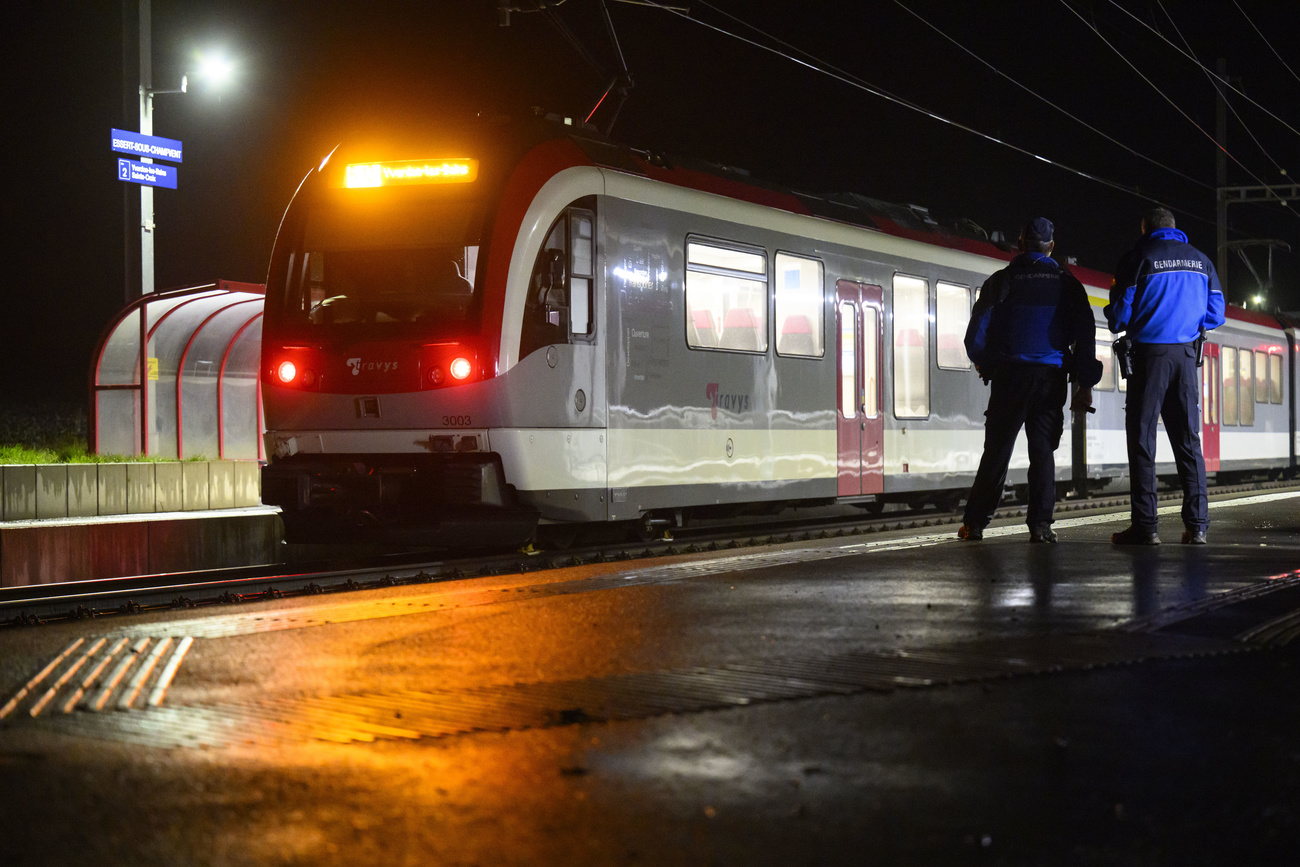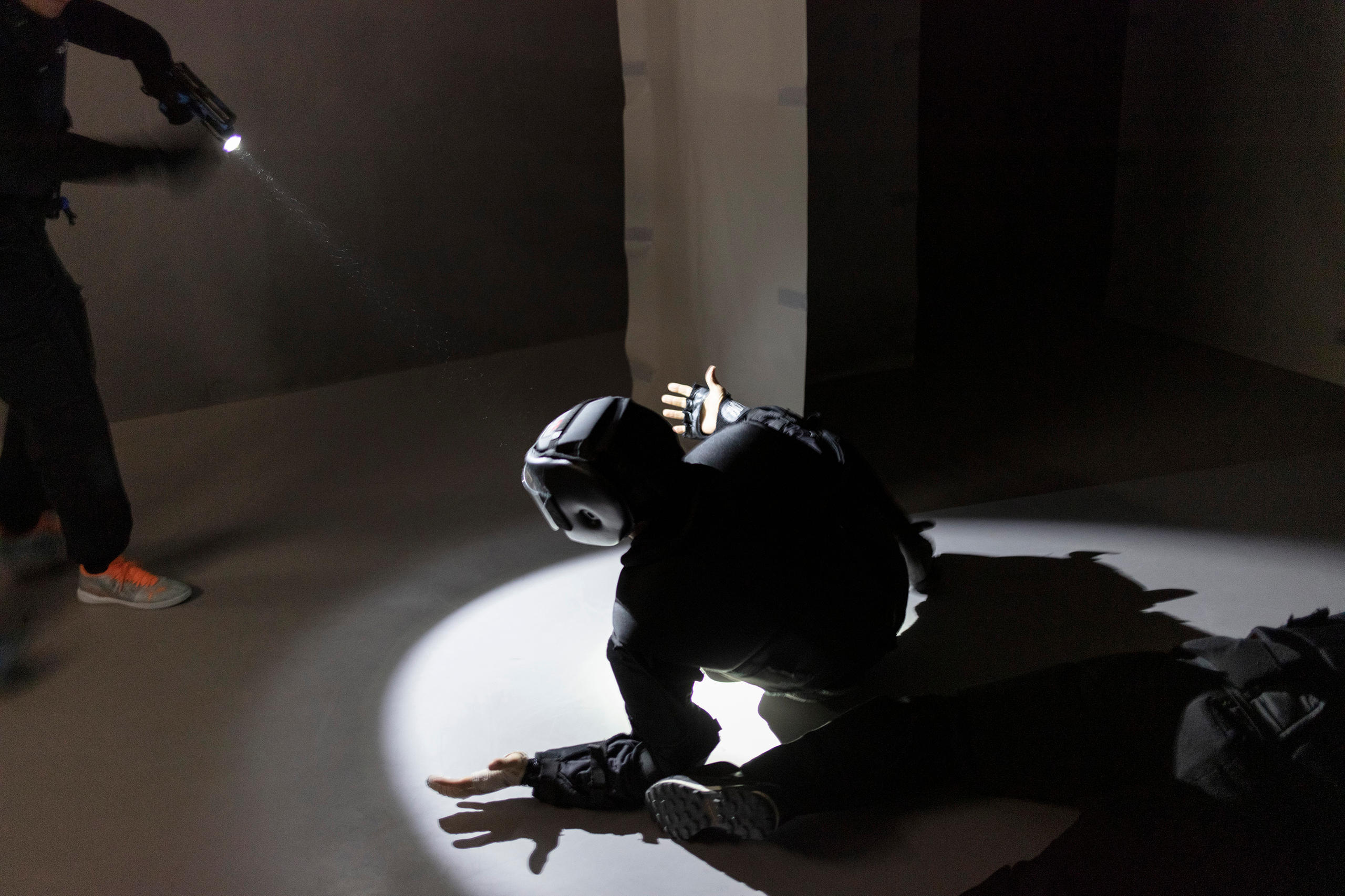
Police give details of dramatic hostage-taking incident

The man who took over a dozen hostages on a Swiss regional train on Thursday, before being shot dead by police, has been formally identified. But various questions about the event remain open.
As initially reported, the man was an Iranian asylum seeker, aged 32. Contrary to what had been first announced, his case had been assigned to the canton of Geneva and not to Neuchâtel, the Vaud cantonal police said late on Friday afternoon.
The number of hostages was meanwhile 13, not 15, the police added. It also clarified the nature of the weapons carried by the man, who spoke Farsi and English during the incident: not only had he an axe and a knife, but also a hammer.
+ Read more about the incident as it was reported on Friday
According to initial investigations, his motivation was related to “his status as an asylum seeker and his insistence on having contact with a member of staff at an asylum centre”. The police previously had to intervene on several occasions because of his behaviour, it said.
Four-hour ordeal
The police also gave new details of their storming of the train at 10.15pm, after almost four hours of “a long phase of negotiations”. The incident had begun at around 6.30pm and the train was stopped at the Essert-sous-Champvent station, with the doors closed. Around 60 police officers took up positions around the it.
“One of the members of the intervention group first used his taser to immobilise the man who was rushing towards them. However, the armed man continued towards them and the hostages. It was then that a second member of the unit used his weapon to neutralise him,” police said.
The man was fatally wounded and died on the spot, despite the presence of a doctor. The passengers were cared for on the spot by a medical unit before being transported by bus to a centre in Yverdon, where they were reunited with their families. A psychological unit was immediately set up.

More
To keep trust, police taught to ‘keep cool’
Several unknowns
The investigation is continuing under the direction of the Public Prosecutor’s Office. The aim is to clarify the hostage-taker’s motives further and to establish the circumstances that led to him being shot, the Vaud police said.
At this stage, a terrorist motive is “clearly not” being assumed. “There is nothing to point us in the direction of a terrorist act. Neither terrorist nor jihadist”, Jean-Christophe Sauterel, spokesman for the Vaud police, told the Keystone news agency on Friday.
Other questions remain unanswered, including at which station the hostage-taker boarded the train, whether he was suffering from any psychological problems, how long he had been in Switzerland, and whether he had a history of violence.
For its part, the Travys train company explained that it had given the investigators video-surveillance recordings of the carriage and several stations on the line. It also praised the “exemplary” attitude of the train driver, who “interacted with the hostage-taker and helped to calm the situation”.
Political consequences
The case will have political consequences. In a press release, the canton Vaud section of the right-wing Swiss People’s Party has called for “an immediate end to the insecurity surrounding asylum”. Its group leader Cédric Weissert will speak at the next session of the Vaud parliament. National parliamentarian Yvan Pahud meanwhile plans to submit an interpellation in Bern enquiring about the status of the asylum seeker responsible for the hostage-taking.
“This is an exceptional event. The police are trained for this type of intervention, as they demonstrated yesterday, since today the thirteen people taken hostage are safe,” stressed canton Vaud’s minister in charge of security Vassilis Venizelos, on Swiss public television, RTS.
Rules respected
“At this stage, I have no reason to believe that rules have not been respected,” he added in response to a question about the use of weapons by police – which follows another case in the town of Morges in 2021. Nor did he want to criticise asylum policy. “We are going to analyse the various events very carefully and we will take the necessary measures,” he said.
“The time has come to take stock of the revised asylum procedure from 2019,” said Alain Ribaux, co-chairman of the Conference of Cantonal Justice and Police Directors. Such an analysis will no doubt lead to the conclusion that more resources are needed in terms of security, support and detection to better prevent asylum seekers from posing a threat. The size of asylum centres will also have to be considered, he told RTS.
Swiss Interior Minister Beat Jans said on social media that he had followed the hostage-taking “with great emotion”. He said that the State Secretariat for Migration “will analyse this case and the possible consequences with the cantons concerned”.
This news story has been written and carefully fact-checked by an external editorial team. At SWI swissinfo.ch we select the most relevant news for an international audience and use automatic translation tools such as DeepL to translate it into English. Providing you with automatically translated news gives us the time to write more in-depth articles. You can find them here.
If you want to know more about how we work, have a look here, and if you have feedback on this news story please write to english@swissinfo.ch.

In compliance with the JTI standards
More: SWI swissinfo.ch certified by the Journalism Trust Initiative



























You can find an overview of ongoing debates with our journalists here . Please join us!
If you want to start a conversation about a topic raised in this article or want to report factual errors, email us at english@swissinfo.ch.